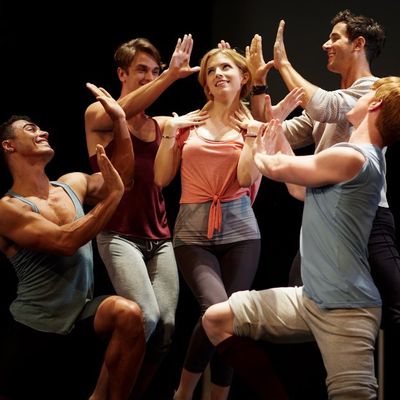
People who love stage musicals have learned to dread their movie adaptations; infidelity leading to disaster is pretty much in the contract. So those of us who treasure The Last Five Years, which had its New York debut during the cold, pinched winter following 9/11, were just as happy that it seemed to belong only to us and was such an unlikely prospect for filming. What, after all, was filmic about it? The author, Jason Robert Brown, has provided only two characters: Cathy, the “shiksa goddess” whose acting career goes nowhere, and Jamie, the “mahvelous novelist” who, unwilling to ride her failure train, gets off. The Last Five Years is itself a tale of infidelity leading to disaster. Beyond that, there’s the problem of its baroque chronology: Jamie’s story moves forward from the relationship’s first bloom while Cathy’s moves backward from its last gasp. (The two timelines meet once, in the middle, when the couple marries.) This can be hard to follow onstage; it would seem to be impossible on film. Oh, and did I mention that it’s not just a musical but one with almost no dialogue? There are just the 14 songs, filled with bravura writing of the tonsil-exposing variety and extremely difficult to sing.
So it’s a relief that Richard LaGravanese’s movie version, starring Anna Kendrick and Jeremy Jordan, has been adapted (as David Edelstein points out in his Vulture review) “with taste, feeling, and a vast reservoir of sadness.” In other words, it’s faithful — indeed it’s probably the most faithful film adaptation of a musical in the history of the business. To start with, the story is unchanged, despite its highly un-Hollywood bipolarity. All 14 numbers, including even “The Schmuel Song,” which many people think is the show’s sole clunker, are performed in their entirety; if any lyrics were changed, I barely noticed. Likewise, Brown’s orchestrations for strings, piano, and percussion are only slightly enhanced. Most shocking, no attempt has been made to round either the characters’ corners or the genre’s: He’s still a bulldozer, she’s still a whiner, and it’s still both.
I don’t want to undersell how thrilling all that is for those of us used to film desecrations like Gypsy and A Little Night Music. And yet, I couldn’t help wondering if the movie is too faithful. Onstage, the perpetually elevated emotions of song are balanced by an equivalent suppression of visual information; in the recent Off Broadway revival (which I reviewed here), there was almost nothing to look at except the actors’ mouths. But LaGravanese, with his gorgeously moving camera and dead-on production design (by Michael Fitzgerald), pours heavy cream over everything. It’s almost too rich. So too is some of the singing, which is clearly enhanced, especially in Kendrick’s case, by big dollops of Auto-Tune. She’s not a theater singer (though she appeared on Broadway in the musical High Society when she was 12); her unaided voice is a bit tight and thin. (Jordan is a theater singer; he just opens his big crocodile jaws and lets the sound out.) Luckily, both are good actors, Kendrick very good, and the story more than survives the electronic doodling.
Brown’s clever structure doesn’t, though. Because flashbacks are such a key element in film grammar, the viewer defaults to that assumption; I doubt anyone new to the material would catch the pathos of the converging timelines. But that’s okay, too; the movie is so good, and such an unexpectedly emotional rendition of the stage musical, that a few quibbles are probably desirable. If we are honest with ourselves, we theater people want great musicals to be untranslatable, just as we want the music itself to be so difficult that no one besides our favorite interpreter can quite do it justice. So it’s nice that both Sherie Rene Scott, the original Cathy, and Betsy Wolfe, the revival Cathy, have charming cameos here. More piquantly, so does Brown himself: He plays an audition pianist who can’t make heads or tails of the crazy music put before him. How delicious that one of the best movie musicals in years — and one of the best musical adaptations ever — concedes that the job is almost too tough to do.

